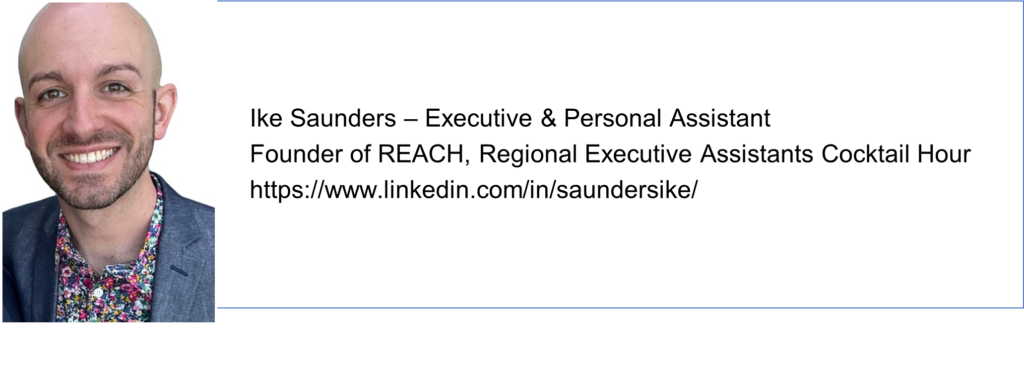
Bonnie Low-Kramen and Kevin Sames shine a light on the day-to-day experiences of the men working as Assistants
Bonnie Low-Kramen: The men working as Executive Assistants are rare. That is because the administrative profession is dominated by women – 93-97% worldwide. As someone who believes that all staff need to have their voices heard – especially underrepresented staff – I feel it is important to shine a light on the day-to-day experiences of the men working as EAs in 2024. In this article, we get to read their stories in their words and walk in their shoes to build bridges of empathetic understanding and ignite productive conversations.
Kevin Sames: In my work as an Executive Assistant in the Philadelphia, Pennsylvania area for over 10 years, I know that on most days, I will get questions and side-eyed looks. I know I will be navigating misconceptions and stereotypes about the work I do. Why is that? The Executive Assistant role is historically dominated by women (formerly called “secretaries,” beginning in WWII when women needed to take on the jobs that men could no longer do). Despite the war ending 79 years ago, some ideas have been stubbornly trapped somewhere in the 1950s.
My men colleagues and I believe it is time to clarify the situation. That is the reason for this article. There is too little written about us. An important note is that even the contributors to this article have varying views about the role, but being able to share openly and honestly helped us to explore the topic. Even among men, we have not had the same experience.
In today’s post-pandemic workplace, Assistants are often referred to by various titles such as Executive Business Partners or Executive Assistants. In this confusing landscape, men challenge traditional gender roles. Some continue to face significant hurdles in gaining recognition and acceptance within their positions, and some have always been easily accepted into the role.
Despite our proficiency and dedication to our roles, many men colleagues encounter persistent misconceptions and biases from both colleagues and society at large. The following are our own unique experiences. In addition, I believe all of us who participated in this article have a heightened sensitivity to the issues that women encounter working in professions dominated by men.
As a way to explore various aspects of this topic, Bonnie and I spoke to four men who work in the administrative professional field.


Why Are More Men Not Seeking the Role?
Kevin: Whether held by women or men, the role is typically one of low visibility. As a group, we tend to be “behind the curtain,” as we’re focused on helping our leaders succeed. We sometimes have opportunities to step forward – beside our leader(s) rather than behind. We love sharing our experiences and expertise with others. The administrative profession is a “best-kept secret,” especially for men. If more men understood the scope of responsibilities, the salary potential, and the positive impact we have on others, more would join the profession.
Jeremy: I believe men, in general, have historically lacked the desire to enter the Executive Assistant profession because it hasn’t been presented as a career. Why do men dominate the sales profession? I believe it’s partly because there are clear goals and paths to make the money you want to make. If we want to encourage more men to enter the profession, there has to be a defined career path. We have to build fair and compelling compensation packages. If Assistants are paid well, rewarded for excellent performance, and given opportunities to earn more money, more men will be attracted to the position.
Prakshal: To get more guys into the EA game, we need to ditch the stereotypes and showcase the cool side of the profession. Maybe make it sound like a secret society (in a cool way) and highlight the fact that being an EA is like being the Batman of the office – the unsung hero making everything work behind the scenes.
What can the women in the profession do to make things easier and more inclusive for men Assistants?
Dusty: Check your own biases, remove stereotypes, be inclusive, and support each other. A basic human need is to feel included, part of a community. Double-check what assumptions you’re making and don’t shy away from a conversation. We much prefer to have a conversation to ensure alignment, rather than assumptions being made that turn into an issue in the future.
Prakshal: For our fantastic female colleagues in the EA world, making things easier for us guys is as simple as recognizing that we’re all in this together. Sharing experiences, treating everyone as equals, and maybe throwing in some humour to break down any lingering stereotypes can go a long way.
What Discrimination and Misconceptions Exist about Men in the EA Role?
Kevin: In 2009, I was laid off. I had an interview for an Executive Assistant position with a company based in Philadelphia which turned out to be the worst experience of my career. Here’s what happened.
I completed two 1-hour interviews and was set for a 1-hour interview with the executive I would support. The interview started well, but 10 minutes in, he was talking about family and asked about my family. I was surprised by this line of personal questioning but decided to respond honestly and openly about my husband. I will never forget the look on his face. The conversation ground to a halt.
The executive then briefly asked one question, barely listening to the answer. He then stood up and thanked me for coming in for the interview. When I left the meeting, I was to meet the Executive Assistant who had already interviewed me for lunch. She told me that she was sure I was going to get the position. She kept saying to me at lunch that she couldn’t believe the interview was so short, and that the two previous interviews with other candidates lasted 1 hour. I didn’t know what to say at that point. I just reverted to ask more about the role.
On the way home is when I started to get mad. Clearly this person had an issue with gay employees. While I am glad I didn’t get offered the job, the fact the interview ended right after the question about my family said it all.
I went to the Philadelphia Human Rights Commission and filed a discrimination lawsuit. When the lawsuit proceeded to the point of interviewing those involved with the interview process, the issue was settled out of court. The company was required to have bias training as part of the settlement. I wish it never happened.
Jeremy: I’ve had several executives assume my CEO’s Assistant was a woman. “I’ll reach out to her,” they’ll say, before they know I am a man. But truth be told, I don’t mind. I have plenty of privilege as a white man in America, so I’m not offended when someone assumes that I am a female Assistant. They find out the truth soon enough, and it has led to interesting conversations.
Dusty: Early in my career, I remember going for an interview and the individual who greeted me didn’t believe I was there for the interview. She specifically said, in disbelief, “I was expecting a woman” when I introduced myself. In an office setting, the administrative professionals were in a communal space of cubicles, while executives were in offices around the perimeter. A visiting executive asked me why I wasn’t in an office like the other guys. I was once referred to as “the rooster of the hen house.”
The typical “Hi ladies” greetings in group emails. This has improved over the years. When this occurs, I make it a point to follow up with the sender and kindly ask them to discontinue making such generalities. Also, holiday gifts that include make-up, flowers, lotions/body butter, perfumes, hair accessories, coupons for spa and facials. I once received a bouquet of flowers “because all the ladies did, and we must be equal.” I respectfully decline the gift, thank them for the idea, and encourage them to consider something more personal that conveys the sentiment. I’m allergic to flowers – should I have to disclose that? Better to focus on equity instead of equality.
Another misconception is that all male EAs are homosexual. How does one’s sexual orientation relate to their career? It doesn’t.
What Is Something You Wish People Knew about Working as a Male EA?
Prakshal: One thing I wish people understood about being a male EA is that it’s not about gender; it’s about skill and passion for the job. Just because I’m a guy doesn’t mean I can’t rock at organizing chaos and keeping things running smoothly. It’s not a gender thing; it’s an organizational superhero thing.
Ike: Being a man in a women-dominated career path affords me great opportunities to learn more about women’s experiences in the workplace. I have greater insight, empathy, and knowledge as I build out my professional relationships with women who are in the same role I am in but who encounter more challenges or workplace discrimination. I am aware of my privilege as a white man. These factors increase my opportunities to develop my allyship and advocacy for women, and I wish more men – in my career path as well as others – had as much opportunity as I do to work with smart, ambitious, and capable women.
Kevin: The EA position is about passion and what you are good at, which does not have to do with gender. It just so happens I am a good “stabilizer” in all the chaos that goes on daily. I would also urge others to ask for the title they want. I was hired as a ‘Business Associate’ and after a conversation, I requested a title change to ‘Executive Business Partner’, which more clearly defined the role.
Normalizing Men in the EA Profession
Ike: The role of the Assistant in the workplace is an invaluable, critical one. If executive and personal Assistant jobs are marketed with the true scope of responsibilities disclosed with transparency and as careers that have large, real, meaningful impact – something women in the career have long known, despite minimal to no recognition of that fact – I think men would be more open to considering the career path.
Normalizing the role of an Assistant as a legitimate career path relies on both improving the corporate perception of the impact our roles have as well as correcting men’s misconceptions about them. Employers can better highlight careers as Assistants as access for men to a diversity of their own worldviews and experiences by joining a women-dominant career track. For both men and women, eliminating or supplementing the word “Assistant” in job titles and better educating colleagues and executives that the title does not mean subservience or inferiority would go a long way, too. (Resource links below.)
Kevin: I currently work with Nish Parikh, CEO & Co-Founder of Rangam Consultants. During my interview process, with him and others, I never had to explain why as a man I was interested in this position. The “why” was explained as the interview proceeded – highlighting my lived & learned experiences in this role. Happily, that is just our company culture.
I asked Nish for his thoughts on hiring men for EA roles. Here’s what he said:
“I’ve had the privilege of hiring and working with many talented individuals, including male Executive Assistants. It’s time that we normalize their inclusion in the profession. Their unique perspectives and skills have been instrumental in keeping me on track and driving our company’s success. It is essential that we continue to challenge stereotypes and create an inclusive environment where everyone, regardless of gender, feels valued and empowered to excel in their roles. It’s about embracing diversity within our communities and recognizing the invaluable contributions that male EAs bring to the table.” ~ Nish Parikh, CEO, Rangam Consultants
The Future for Male Assistants
Kevin: Going forward, an important change to make would be in the title of the role. We, the men and women in these roles, handle all aspects of office management. This includes managing highly confidential information as we give vital support to all the stakeholders who are our responsibility. Our contributions to the success of companies are significant and deserving of commensurate respect. It is 2024, not 1954. We are much more than the obsolete ideas of secretaries.
A successful future for the men of the administrative profession will be about collaborating in a thriving community of fellow professionals. All members of the profession need support and recognition.
Finally, there are more administrative professional associations, training events, clubs, and groups now than ever before – both in person and online. We urge men to actively participate in these groups. Join us and help elevate the profession. Celebrate your successes and seek guidance for the challenges you are facing. Together is better.
Resource Link: “Why should you stop referring to women as females?” by Sacha de Klerk












